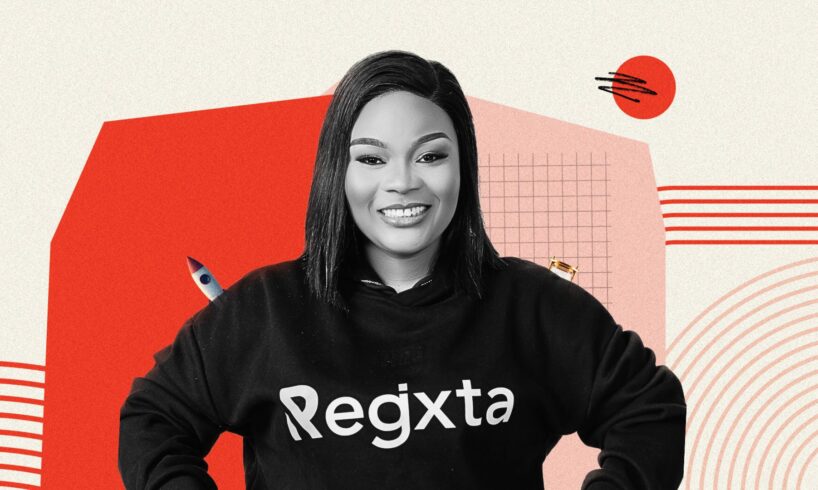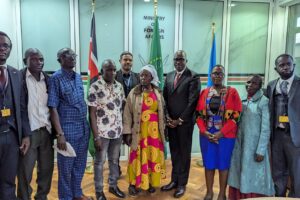
“Banking the unbanked” has moved from being a fintech slogan to a phrase that fintechs throw around for YC funding and press releases. But for Rukayat Bello, CEO and co-founder of Regxta, ‘banking the unbanked’ is more than a slogan; it’s her life’s mission.
Day 1: The mother who didn’t believe in banks
Rukayat Bello’s mother built a thriving food business without ever visiting a bank. She was what financial inclusion experts call “unbanked”, what her daughter would later call “financially excluded.” “My mom does not believe in anything that has to do with banking,” Bello explains. “She loved the kolo so much.”
The fire that destroyed Bello’s mother’s shop started in the house next door. Both buildings were connected. When the house went up in flames, it took everything with it. For Bello’s mother, it meant starting over after a year’s worth of savings, January through November, scorched in one night.
Bello tried to help. She told her mother to go to a popular microfinance bank and apply for a loan, just ₦100,000 to restart the business. Her mother had never borrowed before, so surely they’d approve the loan. They didn’t.
The bank told her to find 29 other people to form a group. They all needed to save together for three months before any loan could be disbursed. Her mother started gathering people, but when they showed up at the bank, the excuses started. “This person does not have a utility bill. This one does not have an ID card,” Bello recalls. “They were giving flimsy excuses.”
Her mother tried another bank. Same story. Different impossible conditions. Back and forth, back and forth. Eventually, she stopped trying.
Family and friends scraped together what they could—₦500 here, ₦1,000 there. It wasn’t enough to restock rice. So Bello’s mother, who once ran a thriving food business, made do with selling pepper and corn in front of the house. Bello told her mother she’d defer her university admission. Her mother refused. She took on more work like washing clothes for other people, anything to keep her children in school. That image of her mother, broken but still fighting, excluded from a financial system that should have helped her, stayed with long after she graduated.
By the time Bello finished her youth service (NYSC), she’d saved over ₦300,000. She also had a boyfriend and both were planning to get married. She was saving toward an elaborate wedding. Then one day, her boyfriend came over. They were discussing wedding plans when something inside her shifted. She thought about starting a business.
She sat with the idea for a day. What kind of business? Then she remembered her mother. The kolo that burned. The loan applications that went nowhere. The 29-person group requirement. The utility bill her mother didn’t have. “I just remembered that there was a time my mom was not able to gather and get money,” Bello says. “And then she was not even the only one. A lot of people actually need money to support their businesses.”
She went to her mother with a proposal: She’d cancel her wedding and use the budget to start a microfinance operation, giving loans to people like her mother, market women who couldn’t access formal banking services. Her mother resisted at first but eventually gave in.
Bello and her husband, Afis Bello, pooled their resources together: ₦750,000. They called the operation The Bells Dynamic Option. On the first day of operations in 2018, her mother brought her 77 customers. They split that ₦750,000 among those 77 customers disbursing small amounts: ₦5,000-₦10,000 here, ₦15,000 there.
The next day, people came back, some with repayments, others, asking for another loan. This was how the business began.
Get The Best African Tech Newsletters In Your Inbox
Day 500: Name changes and borrowed trust
The Bells Dynamic Option didn’t look like a traditional microfinance bank, even though that’s technically what it was. It was a lean but efficient team, processing loans quickly and documenting their operations digitally. In 2021, three years in, they rebranded. The Bells Dynamic Option was a confusing name. “The name is not resonating with you giving loans to people,” advisors kept telling them. So they tried to register as ‘Register’.
The Corporate Affairs Commission (CAC) rejected it. Too generic. They needed documentation they didn’t have.
So they tweaked it. Register became Regxta. R-E-G-X-T-A. “It was actually funny,” Bello admits. But the name stuck.
As they grew, they hit a fundamental problem: the people they wanted to serve couldn’t operate smartphones. Most microfinance banks were moving toward mobile apps, assuming customers would download and manage everything themselves. Bello looked at her mother—at the 77 women her mother had brought on that first day—and knew that wouldn’t work.
So they began recruiting agents.
The agent model solved the smartphone gap. These were young people in the communities where customers lived. Regxta trained them for two weeks on how to open accounts, accept deposits, and process loan applications through Regxta’s mobile app. The agents became the bridge between technology and the market women who couldn’t use it themselves.
The genius of the model wasn’t just the agents. It was the trust structure Regxta built underneath.
If you wanted a loan from Regxta, you needed a guarantor, but not just any guarantor. It had to be someone who was already a Regxta customer. Someone in your community. Someone whose own loan depended on your repayment. “We do cross-guarantorship,” Bello explains. “Before you get a loan from Regxta, you must give us someone who is already a member.”
It’s a location-based trust network. Your neighbor guarantees you. If you default, they can’t get their next loan until they either make you pay or pay for you themselves.
The results were stunning. Out of 23,000 customers currently on loan or savings with Regxta, only 72 are blacklisted for expired loans. That’s less than 1% default rate. Or as Bello puts it: “99.999% healthy portfolio.”
But building that portfolio took years of grinding through Nigeria’s chaotic business environment. By 2022, they were expanding into other states, training more agents, and entering accelerator programs that exposed them to more sophisticated technology. That’s when they realised they needed technical co-founders.
They found Moses Obika, and brought him on. Moses said he couldn’t do it alone, so he brought another developer, Henry Ozoani. Suddenly, The Bells Dynamic Option, now Regxta, had four co-founders instead of two.
Get The Best African Tech Newsletters In Your Inbox
Day 1,000: From kolo to ₦2 billion
Today, Regxta operates in over 100 communities across eight states in Nigeria. They’ve created jobs for more than 200 agents. They’ve disbursed over ₦2 billion in loans. They’ve raised close to $1 million and are currently raising a $2 million pre-seed round.
And Regxta now owns a building. A two-story building in their name, set to be opened in 2026.
Regxta stopped being just a lending platform a while ago.
They’ve started doing asset financing—buying freezers for customers who pay in installments. They’ve partnered with suppliers to sell bags of rice that customers can pay for over time. They’re paying children’s school fees for parents who need the cash flow flexibility. They’ve even run a micro-pension pilot with ARM Pensions, though they paused it when agents got too distracted promoting it over core lending products.
“We want to be a market hub for the informal sector,” Bello says. “Whatever thing you want to sell to these people, you should be able to come through us.”
It’s an ecosystem play. Regxta isn’t just replacing the kolo with a savings account. They’re replacing the entire informal financial infrastructure—the rotating savings groups (ajo), the loan sharks, the emergency borrowing from family—with something more reliable and dignified.
And it’s working because Regxta understands something most fintechs miss: financial inclusion isn’t just about access. It’s about dignity.
“My mom was financially excluded because she had no credit history, no bank account, and no valid ID card,” Bello says. “But I am glad that I was able to include my mom financially. Not just in terms of lending. My mom can operate our button phone very well now. If she wants to dial anything, she can do that. That’s because of the financial literacy.”
Financial inclusion, Bello explains, has four pillars: payments, account opening, lending, and financial literacy. Regxta does three of them. The only thing they don’t do yet is payments, but version 2.0 of their platform will include personal banking for the 40% of customers who now use smartphones.
Five years. ₦2 billion in loans. 25,000 customers. 200 agents. A building. A MicroFinance Bank license on the way.
In five years, Bello wants Regxta to be a unicorn. In 10 years, she wants it to be a household name in agency banking and lending across Africa, not just in Nigeria. “When it comes to fintech targeting the people at the bottom of the pyramid, we want to be leading using the agency platform.”
It’s an audacious goal. But then again, canceling your wedding to start a microfinance bank with ₦300,000 was audacious too.
“We will never stop,” Bello says.




